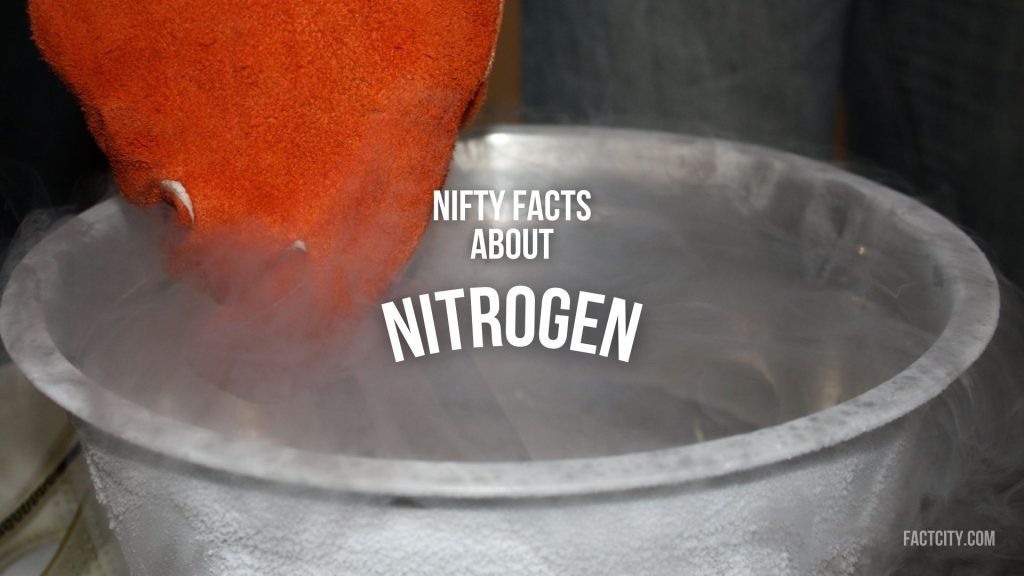Abundant and a vital part of all our lives, nitrogen is an element that keeps all life on Earth… well, living! Like other gases in the periodic table, nitrogen has more than a few interesting features that continue to fascinate us – even if we can’t see it!! But how much do you know about this special gas? Here are some fun facts about nitrogen that will likely bring back memories of science class.
1. It is represented by the symbol “N” on the periodic table.
Nitrogen is very easy to find on the periodic table as it is represented by the chemical symbol “N.” It has the atomic number 7, and is found between the elements carbon (C) and oxygen (O).
2. Nitrogen is everywhere and is completely invisible.
It exists as a diatomic gas, N2, in its natural state. It is colourless, odourless, and tasteless and is easily the most abundant element in Earth’s atmosphere, and that’s because it makes up to approximately 78% of the air we breathe.
3. Nitrogen is vital for life to thrive.
Nitrogen is a vital component you will find in amino acids, proteins, and nucleic acids such as DNA and RNA, making it essential as both building blocks and the continued thriving of all living organisms. And, the fact that it makes up most of our atmosphere means we’re pretty accustomed to it!
4. Nitrogen fixation keeps our plants and trees growing strong.
Nitrogen fixation is the scientific process of converting nitrogen gas into ammonia by nitrogen-fixing bacteria. The process makes atmospheric nitrogen available to plants and is essential for agriculture.
5. You can liquify nitrogen, but only in deep cold.
Nitrogen can be liquified at extremely low temperatures (-196 degrees Celsius or -321 degrees Fahrenheit). It is commonly used in various industrial applications, including cryogenics. No chance of trying this experiment at home, unfortunately!
6. It barely reacts to other chemicals.
Generally speaking, nitrogen gas is pretty inert. That means that it doesn’t easily react with other elements or compounds under normal conditions. That means it’s unlikely to produce fascinating effects when mixed up.
7. However, it can form a wide range of compounds.
Nitrogen, while not particularly reactive, works well with others – it’s a base element for lots of different chemical compounds. These include ammonia (NH3), nitric acid (HNO3), and nitrous oxide (N2O), which have numerous industrial and agricultural uses.
8. It can be used as laughing gas.
Nitrogen in the form of nitrous oxide can be used as a mild anesthetic in dentistry and medical procedures. It is more commonly known as laughing gas. It’s even used as a recreational drug by some people, though it’s proven to cause nerve damage, suffocation, and can even lead to paralysis. Don’t huff it!
9. It is commonly used in the food industry.
Nitrogen gas is also commonly used in the food industry, notably in the packaging of foodstuffs. This is due to the fact that it helps prevent oxidation and spoilage and therefore makes packaged food last longer.
Liquid nitrogen can also be used in the food industry to rapidly freeze meat and vegetables, create ice creams and sorbets, and make “smoke” effects.
10. It can be very dangerous for divers.
Nitrogen narcosis, also known as “rapture of the deep,” is a condition that can affect divers at great depths. The condition occurs due to the increased pressure of nitrogen in their breathing gas.
FAQs about Nitrogen
What happens if you have too much nitrogen in your body?
Having high levels of nitrogen in your body can make you feel dizzy and lightheaded, and, in severe cases, it can make you lose consciousness or even kill you. That is why divers in particular are warned to be so careful about their nitrogen levels as they dive.
What produces nitrogen?
The largest source of nitrogen in the world is the atmosphere! It makes up most of our atmosphere, so is technically all around us!
How do you get nitrogen in your body?
Aside from breathing nitrogen, humans get nitrogen in their bodies by consuming various plant and animal products. We’re pretty accustomed to it, but it’s not advisable you consume it direct, such as through laughing gas.
Further reading
https://www.rsc.org/periodic-table/element/7/nitrogen
https://pubchem.ncbi.nlm.nih.gov/element/Nitrogen
Do you know any interesting facts about Nitrogen? Share them in the comments below!
